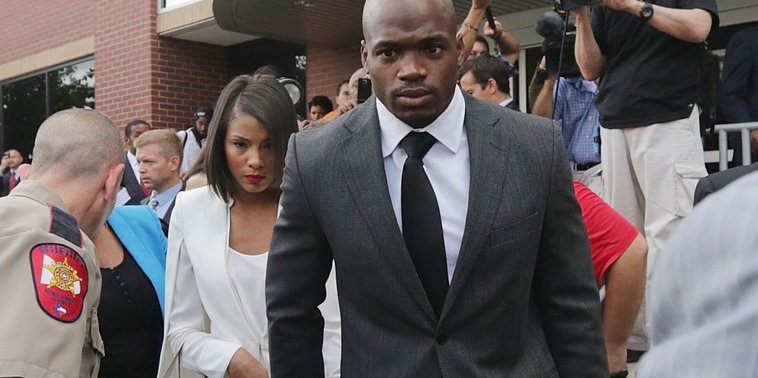MINNEAPOLIS — The NFL’s hard line on Adrian Peterson held up.
Videos By Rare
The league-appointed arbitrator for Peterson’s appeal affirmed the unpaid suspension until at least next spring, the final result of the child-abuse case that kept the Minnesota running back out of all but one game this season and widened the rift between the NFL and its players over the fairness of the disciplinary process.
The decision by Harold Henderson, a former league official, was announced Friday.
That means Peterson, though he avoided jail time and a felony conviction, has been fined more than $4.1 million as part of the punishment from the NFL. That’s the cost of the six-game suspension that was issued Nov. 18 under the league’s personal conduct policy. He will not be considered for reinstatement before April 15.
The NFL Players Association called Henderson’s objectivity into question and said it was “considering immediate legal remedies” to the decision.
“The NFLPA expected this outcome, given the hearing officer’s relationship and financial ties to the NFL,” the union said in a statement. “The decision itself ignores the facts, the evidence and the collective bargaining agreement. This decision also represents the NFL’s repeated failure to adhere to due process and confirms its inconsistent treatment of players.”
Responding to earlier union criticism of Henderson, the NFL said that was unwarranted, pointing to his current post as president of the NFL Player Care Foundation, which is funded jointly by the union and the league. This was the 88th appeal Henderson has heard.
Henderson’s announcement was a decisive victory for NFL Commissioner Roger Goodell, whose authority was overruled last month by the arbitrator in the case of former Baltimore running back Ray Rice. Former U.S. District Judge Barbara Jones said Goodell acted arbitrarily with an “abuse of discretion” by extending of a two-game suspension for Rice into an indefinite ban when video surfaced of Rice punching the woman who’s now his wife. Rice was reinstated, but he had no team to return to because the Ravens released him a week into the season.
The union’s grievance for Peterson was similar, arguing essentially that Goodell was making up protocol for discipline as he went along. But Henderson forcefully wrote that he saw no bounds being overstepped by the league boss.
After Rice’s case emerged, Goodell announced in August a stiffer penalty for players involved with domestic violence. The union argued that Peterson, who was charged with felony child abuse in September for use a wooden switch to discipline his 4-year-old son in May, should be subject to the prior guidelines. Henderson said that argument didn’t matter.
“The Commissioner has broad discretion to impose appropriate discipline for violations of the personal conduct policy, and his recent pronouncements simply reflect his current thinking on domestic violence and other incidents involving physical force,” Henderson wrote.
The Vikings declined to comment.
Peterson led the NFL in rushing twice, including 2012 when he had 2,097 yards and fell 9 yards short of breaking Eric Dickerson’s single-season record, but he might never play again for the Vikings after this mess.
The three-time Associated Press All-Pro pick and six-time Pro Bowl selection has a contract that runs through 2017, but that’s not guaranteed like the other major sports. The Vikings could release him before next season and owe him nothing, taking only a $2.4 million hit on their 2015 salary cap.
The Vikings initially announced Peterson would stay on the active roster after the first game he missed following the indictment, but they reversed course less than two days later following intense public pressure and placed him on the exempt list at Goodell’s approval. That’s like paid leave, which the union argued counted as discipline and therefore contributed to an overreaching punishment. Henderson dismissed that argument, too.
Peterson pleaded no contest to misdemeanor reckless assault in Texas on Nov. 4 for probation time, community service and a small fine. He acknowledged physically disciplining the boy as he had been as a youth, but he said he meant no harm and was sorry for the trouble he caused.
“I love my son more than any of you can imagine,” he said outside the courthouse that day.
Still, Henderson sided with Goodell in his written reprimand of Peterson’s purported lack of remorse.
“While the discipline assessed is indeed greater than in most prior cases, this is arguably one of the most egregious cases of domestic violence in this Commissioner’s tenure — the severe beating of a 4-year old child, with a tree branch, striking him repeatedly about the body and inflicting injuries visible days later,” Henderson said.
At the crux of the NFLPA’s argument for reinstatement was what NFL executive vice president for football operations Troy Vincent told Peterson last month with the dispute at its height.
The union claimed Vincent told Peterson he would receive a two-game ban if he attended a hearing on Nov. 14 with Goodell. Peterson declined to meet that day with Goodell, citing uncertainty about the NFL’s intent to question him. Goodell then announced on Nov. 18 the suspension.
A recording and a transcript of what Vincent told Peterson was presented by the NFLPA to Henderson, who oversaw a hearing on Dec. 2. Peterson attended that and listened via telephone as the hearing continued on Dec. 4, when Vincent was questioned.
But Henderson concluded Peterson was not retailed against for not going to meet with Goodell.
“Mr. Vincent testified that he never promised a two-game suspension or that the old policy would control, but rather encouraged Mr. Peterson to ‘go through the process and all things will be considered,'” Henderson wrote. “He said, ‘I didn’t promise Adrian anything. Never promised. Adrian needed to show up. Talk.'”

